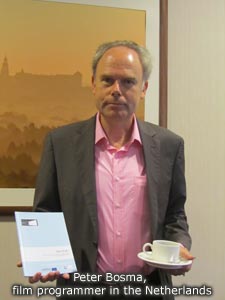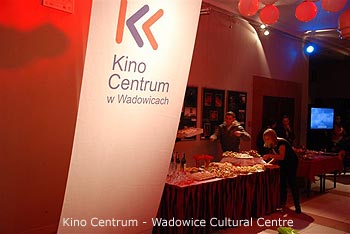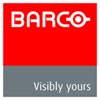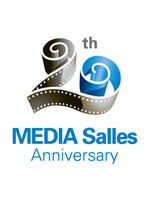
Reg.
Trib. Milano n. 418 del 02.07.2007
Direttore responsabile: Elisabetta Brunella
International Edition No. 97 - year 8 - 2 September 2013 |
***
From the tenth
edition of the course
"DigiTraining Plus: New Technologies for the European Cinemas of the Future"
Cracow and Warsaw
28 August - 1 September 2013
- daily update -
"The installation of a digital projector is not an aim in itself but the beginning of a new adventure." This is one of the considerations that emerged yesterday, 1 September, from the presentation of the group work that took place at the end of the tenth edition of "DigiTraining Plus".
The inspiration offered for the work by the over thirty professional operators from all over Europe, from Spain to Croatia, Italy to Hungary, was based on the content of the day's work on Saturday 31 August.
 How to programme a digital cinema and communicate with its audiences were the topics of the talks by Petr Vitek and Peter Bosma. Vitek, the genial co-founder of Aero, Prague, a landmark for quality cinema, offered participants a series of examples of how to involve the audiences themselves in the promotion of the movie theatre.
How to programme a digital cinema and communicate with its audiences were the topics of the talks by Petr Vitek and Peter Bosma. Vitek, the genial co-founder of Aero, Prague, a landmark for quality cinema, offered participants a series of examples of how to involve the audiences themselves in the promotion of the movie theatre.
Agreements with art academies and design institutes allowed the Aero and its other "satellite" cinemas to make use of graphics and images with original features but at low cost. On the other hand, the authors of the festival posters or programmes of the various initiatives - all students from the school - come to grips with real-life customers and have the opportunity to show their talent.
Even the "average spectator" can play an active role, for example by decorating their balconies with the free banners the Bio OKO gives its fans. In the digital age, by means of the intense and original use of the social media, the Aero encourages its aficionados almost every day to talk about their favourite cinema and its programme, thus creating a growing community of supporters. More or less at no cost.
The Svetozor's programming is just as creative, though clearly in the framework of a two-week programme. Centring on the screening of one or two international titles on first release - offered at different times on different days - it is completed by productions with more local interest, documentaries, anteprimas, children's films and extra content (starting with operas from the New York Metropolitan), programmed for the time slots best suited to the spectators in question. Indeed, the talk by Peter Bosma, independent programmer and researcher, which started with a categorization of theatres, focused on the positioning of the cinema, based on a knowledge of its audiences. From the "cinema nostalgia" to the "luxury" theatre, Bosma identified six programming modes, challenging the course participants to imagine the seventh type, based on digital technology.
 It was the Centrum cinema of Wadowice, visited by the participants on the Saturday afternoon, that offered a practical example of this type. Linked to the cultural centre of this town with a population of twenty-thousand, which became famous as the birthplace of Pope John Paul II, the Centrum is part of the Małopolska circuit, digitalized thanks to the European Regional Development Fund, with a view to launching tourism in the south of Poland. Digital projection that makes it possible to screen several new titles at the same time as the big cities and to diversify offer, from 3D to extra content - often connected to Wadowice's special tourist status, linked to the figure of its most illustrious citizen - have once more boosted cinema-going, threatened in the past by competition from the big cinemas in Cracow, the only ones to provide a variety of "fresh" titles. Mark Waldman and Ron Sterk insisted, though in different ways, on the fact that after changing the equipment, the exhibitor cannot assume that this is all there is to it. Head of dcinex's customer assistance to European cinemas, Waldman drew the participants' attention to the fact that they should adopt practices that ensure the duration of the equipment - starting by maintaining the best conditions for its operation, from staff training and experimentation with new software before its widespread use.
It was the Centrum cinema of Wadowice, visited by the participants on the Saturday afternoon, that offered a practical example of this type. Linked to the cultural centre of this town with a population of twenty-thousand, which became famous as the birthplace of Pope John Paul II, the Centrum is part of the Małopolska circuit, digitalized thanks to the European Regional Development Fund, with a view to launching tourism in the south of Poland. Digital projection that makes it possible to screen several new titles at the same time as the big cities and to diversify offer, from 3D to extra content - often connected to Wadowice's special tourist status, linked to the figure of its most illustrious citizen - have once more boosted cinema-going, threatened in the past by competition from the big cinemas in Cracow, the only ones to provide a variety of "fresh" titles. Mark Waldman and Ron Sterk insisted, though in different ways, on the fact that after changing the equipment, the exhibitor cannot assume that this is all there is to it. Head of dcinex's customer assistance to European cinemas, Waldman drew the participants' attention to the fact that they should adopt practices that ensure the duration of the equipment - starting by maintaining the best conditions for its operation, from staff training and experimentation with new software before its widespread use.
Instead, Sterk, Director of the Dutch exhibitors' association, who has contributed to inventing and implementing the Cinema Digitaal project allowing all the Netherlands' cinemas to shift to the new technology, placed the emphasis on the importance of starting to "think digital". Letting go of the old models bound to traditional film, discovering new potential and innovative ways of working is a much greater challenge - but far more exciting - than just changing the equipment. This, according to Sterk, is the new way of thinking that will increase the cinemas' life expectancy. For those who do not think they have the necessary resources, Sterk points to a path that has been experimented successfully in the Netherlands: that of cooperation. It was by combining their resources that the Dutch exhibitors - even in the smallest cinemas - managed to digitalize using a collective VPF model and it is once again thanks to cooperation that they created "Cinéville", the monthly subscription that allows free access to arthouse cinemas in Amsterdam and nine other cities. In this way, even independent cinemas have equipped themselves with a tool which in the past was the prerogative of the leading European circuits.
Informamos a nuestros seguidores que hablan español que el compañero de la revista Cineinforme Antonio Roldán está cubriendo el curso DigiTraining en exclusiva para España.
Aqui pueden consultar sus articulos diarios: http://www.cineytele.com/noticia.php?nid=40382
The course is organised by MEDIA Salles with the partnership of 


MEDIA Salles' contacts and
address
MEDIA Salles
Piazza Luigi di Savoia, 24 - 20124 Milano - Italy
Tel.: +39.02.6739781 - Fax: +39.02.6690410
E-mail: infocinema@mediasalles.it
Website: www.mediasalles.it